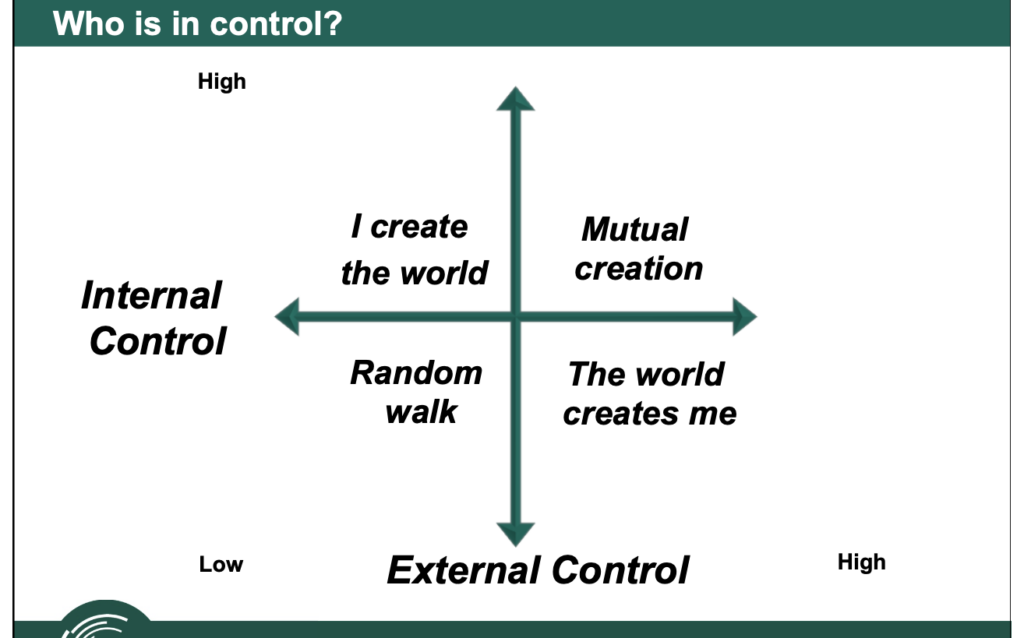As a leadership coach you may be working closely with corporate clients who typically are in mid to senior level managerial positions. And while they may be in control of a small part of the puzzle, they are not in control in the larger scope of things.
And particularly with Covid-19 hitting us, there have been lot of changes in the way organisations are functioning. And the changes are probably being driven by those in top positions, aka the ‘drivers’ of the organisation – which could be the CEOs or Founders. And the mid-senior level managers can either respond to those changes or be mere ‘passengers’ in the journey.
As we slowly make our way back to ‘normal’, how are your coaching clients (and you as a leadership coach as well) responding to the changes that are happening in their organisational space – with hybrid workplaces, increasing digitisation, change in work culture? There may be times when they are not able to resonate with the changes being made or even in full disagreement. But as the one not in the ‘driver’s’ seat, how do they respond to these changes – are they going to be reluctantly passenger (i feel like a passenger in my own life!) or is there a third role that they haven’t yet discovered?
The Driver, The Passenger, and…
In a manner of speaking when we take about leadership, people assume that they have to be in the driver’s seat (be the driver of your own life vibe!) in order to lead. This can be either in the form of a title or a role or a position that they take. In a way they are empowered to be playing the role of a leader in the organisation. The ‘driver’ also retains quite a bit of control over the ‘bus’ (the organisation), i.e., at what pace the bus travels, which direction it takes, etc.
And when we think of this bus, we end up qualifying those who are not in the driver’s seat to be the passenger; someone who is passively going on and minding their own business. Another kind of passenger, worst case scenario, can be someone who is instigating other passengers to create some kind of conflict or feud. This is when the passengers become destructive, which in turn ends up distracting the driver, aka the leadership.
What ends up happening with taking such a binary point of view (if I’m not the driver then I must be the passive passenger), we miss out on the possibility of a different role.
Which brings us to the third role:
The Conductor/Navigator
If you’ve not been assigned the role of the driver then as a passenger you can also pick up the additional role of a conductor. A person with this role could help the driver see what’s coming ahead, if there’s a diversion or a roadblock to avoid, or even to check in with the rest of the passengers to see how they are doing and if a bio-break is required, which they could then would pass on to the driver. This would translate similarly in an organisation, wherein one needn’t be a designated leader and yet not be a mere passive employee in the organisation.
Co-Create Your Way Into Success
So, as you can see, the role of the conductor/navigator is neither like that of the passenger or the driver. It’s somewhere in the middle and is very unique. So, if you find that your clients are not in the driver’s seat and are finding themselves being passive and feeling helpless and dejected, use this travel analogy to see how they create a new position for themselves which better uses their resources and energy. This ensures that one doesn’t take a supremely binary and dichotomous approach to work and life and can in fact see that opportunities lie in every role – it’s just a matter of reframing how one looks at it and seeing that it’s a mix of the outer as well as the inner reality that create life around us.
An excellent explanation of this has been done by Marshall Goldsmith when he speaks about co-creation, represented in the graph below:

When you look at this graph, you see the parameters internal control vs external control as well as low and high. Here, one of four scenarios can take place:
- When you perceive there is low internal as well as external control, you are encountering and sailing through life very randomly. Things are happening by-chance to you and around you.
- When you perceive there is high internal control and low external control, you feel that you are the master of your destiny – you create the world around you.
- When you perceive there is high eternal control and low internal control, you feel that the you have very little say in your hands, and the world controls and creates your life. This may end up creating a victim mindset in an individual.
- And finally, there is the aspect of mutual creation, wherein the outlook is that ‘I am creating the world, and simultaneously the world is creating me’. Here you are taking as much control in your hands as possible and at the same time you are cognisant of the fact that you can’t escape the world’s influence on you either.
To tie all this into one beautiful little box, I’d say you should see for yourself where you are falling in terms of the four quadrants showcased above and see how to edge closer towards the upper right quadrant of mutual control – where you are as much the creator of your destiny (you are the driver of your own life!) as the world around is as well. And when you’re able to do this for yourself as a leadership coach, communicating the same to your coaching clients will be effortless and can change the way they play the game of work as well as life.
About Simply.Coach
Simply.Coach is an enterprise-grade coaching software designed to be used by individual coaches and coaching businesses. Trusted by ICF-accredited and EMCC-credentialed coaches worldwide, Simply.Coach is on a mission to elevate the experience and process of coaching with technology-led tools and solutions.
Read More:
Help Your Clients Make Better Decisions With the Six Thinking Hats
The Wheel of Life: A Coaching Tool to Help Clients Prioritise & Bring Balance
Underrated Ways of Getting Coaching Clients Online
What are Common Challenges Faced by a Coach?
5 Essential Components to Build a Strong Coach-Client Relationship

Executive Coach & Co-founder of Simply.Coach
Recognised as one of the Most Talented Coaching Leaders in India by CHRO Asia, Ram is an ICF certified coach with more than a decade of coaching experience Before co-founding Simply.Coach in 2020, Ram worked across the gamut of organisations, from start-ups through to global MNCs. Having served as VP and Country Manager for Publicis Sapient, Ram’s corporate expertise helps him focus on positive change to empower leaders to reach their goals









